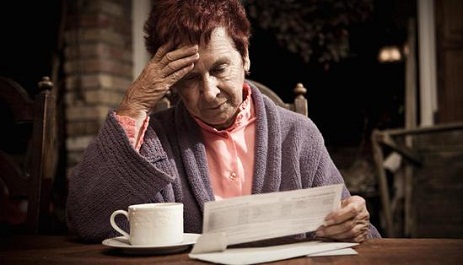Among oldest Americans, 1 in 5 dies broke

Based on surveys repeatedly pointing to dismally low levels of retirement savings, most American households have reason to be concerned. The latest report on how many Americans die broke comes from an analysis by the Employee Benefits Research Institute based on data from the University of Michigan`s Health and Retirement Study.
Of those 85 or older who died between 2010 and 2012, roughly 1 in 5 had no assets other than a house, according to the analysis. (Tweet This) The average home equity was about $140,000. Roughly 1 in 8 of those households had no assets at all.
Those who died single at 85 or older fared worse, roughly a quarter had only some equity in a house—about $83,000 on average. One in 6 had nothing, and 1 in 10 died with an average debt of about $6,000.
For those who died at a younger age, the numbers were even worse. Some 30 percent of households losing a family member between ages 50 and 64 had no financial assets left. Those households also had lower incomes than older retirees.
For many retirees, the end of life comes with major medical costs that can wipe out savings. But others have little savings to begin with.
"A lot of folks really don`t have much of a financial cushion by the time they get to the end," said MIT economist James Poterba, whose 2012 study found that many Americans die with "virtually no financial assets."
Poterba`s study found that 46 percent of American`s had less than $10,000 in financial assets in the last year of their life.
"Many more people who have very low financial assets at the end of life have been bumping along with low assets through most of their retirement," he said. "They just hadn`t saved very much."
A number of studies have detailed how little retirees have saved.
Last fall, a Harris poll conducted for Wells Fargo found that a third of respondents between ages 25 and 75—with a household median income of $63,000—weren`t contributing anything to a 401(k), an IRA or other retirement savings account. Half of those over age 50 said they won`t even have enough money to "survive" on in retirement.
And for those nearing retirement, the median savings was just $14,500, according to a study last month by the National Institute on Retirement Security.
"So it`s not surprising that there a lot of people who get to 75 or 85 and have nothing left," said Diane Oakley, the institute`s executive director. "They didn`t have much to begin with."
While living longer requires a larger nest egg at retirement, the Employee Benefits Research Institute analysis found that older households fared better financially at the end of life.
"Households which lost family members at relatively younger ages were also the households with lower asset holdings and lower income," said Sudipto Banerjee, author of the study. "Singles who died relatively early were in much worse financial condition than couples."
People who died earlier also had significantly lower household income than households with all surviving members.
Poterba suggested there may be two reasons people who died older seemed better off financially. One is that healthier people may be able to earn more in their lifetime than those with life-long health issues that may shorten their life span. Conversely, people with greater wealth have better access to health care that may help them live longer.
Older workers may fare better because many of them are from a generation that was more likely to be covered by a defined benefit pension, which helped them pay the bills without tapping into savings, said Oakley.
That`s not going to be true for coming generations, who are about half as likely to have access to a defined benefit plan at work, she said.
Read MoreHere`s one way not to fall short on retirement $$$
As more households rely on building their own nest egg, they`ll need to put away more savings. But it remains to be seen whether younger workers will be able to do so—especially if interest rates stay low for an extended period, said Poterba.
"It`s very easy for people not to realize how expensive it is to provide a steady income stream and how much you need to build up," he said. "As a matter of arithmetic, if we`re in a very long period of lower rates of return, it`s going to be challenging for younger households to build up a nest egg by the time they reach 65 because they don`t get the compounding that you get at higher rates of return."















































